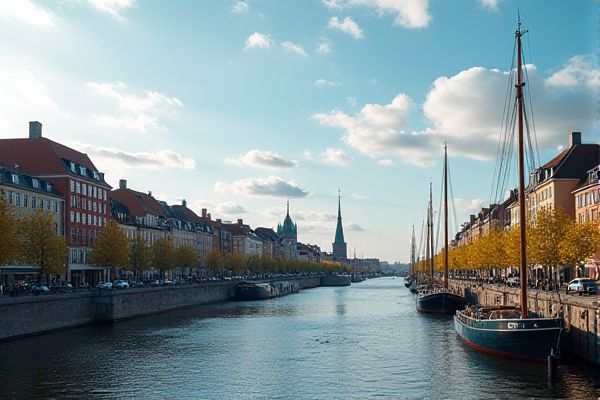
Cultural and recreational activities in Denmark: Hygge culture - embrace coziness and contentment. Danish design and architecture. Cycling infrastructure and traditions. Royal Copenhagen ballet and theater. Vibrant music festivals. Historic castles and museums. Christmas markets and traditions. Danish gastronomy and New Nordic cuisine. Extensive coastline and beaches. Diverse artisans and creative communities.
Hygge culture - embrace coziness and contentment
Hygge culture in Denmark emphasizes slow living, coziness, and contentment, often through informal, wholesome activities with family and friends, such as sharing meals, lighting candles, and appreciating simple pleasures. This way of life reflects the country's values of equality, solidarity, and community connection. For more insights into this unique approach to living, visit Esperanto Magazine, where a comprehensive exploration of Hygge culture offers a vivid portrayal of its significance in Danish society.
Danish design and architecture
Danish design and architecture are celebrated through various cultural and recreational activities, including visits to the Danish Architecture Center (DAC) in Copenhagen, which offers exhibitions, guided tours, and events showcasing historic and contemporary architecture and design. Additionally, visitors can explore designed spaces, attend architecture tours, and engage with iconic Danish design at museums like the Designmuseum Danmark.
Cycling infrastructure and traditions
Denmark's cycling culture is deeply rooted in its extensive and safe cycling infrastructure, with over 12,000 kilometers of dedicated bike lanes, cycle tracks, and bridges, making cycling a preferred mode of transport for daily commutes and recreational activities. This network is integrated into all aspects of [Danish life](https://reelight.com/blogs/articles/embracing-the-pedal-power-exploring-the-danish-cycling-culture), ensuring that biking remains a celebrated and essential part of the country's lifestyle.
Royal Copenhagen ballet and theater
The Royal Danish Ballet, based at the Royal Danish Theatre in Copenhagen, is one of the oldest and most renowned ballet companies in the world, founded in 1748. It is known for its rich history, including the influential works of August Bournonville and Harald Lander, and continues to perform a mix of classical and contemporary ballets, maintaining its legacy while innovating with new choreographies. For more detailed information, please visit the Royal Danish Ballet page on Wikipedia.
Vibrant music festivals
Denmark is renowned for its vibrant music festivals, including the Roskilde Festival, one of Europe's largest music festivals, the Copenhagen Jazz Festival with over 700 concerts, and the NorthSide Festival in Aarhus, which attracts major international acts. Other notable festivals include Distortion, a street party in Copenhagen, Tinderbox in Odense, and Stella Polaris, a free electronica festival touring various cities. To discover more about these exciting events and immerse yourself in Danish culture, visit VisitDenmark for further information.
Historic castles and museums
Denmark offers a rich cultural experience through its historic castles and museums, including Christiansborg Palace, Rosenborg Castle, Kronborg Slot, Frederiksborg Castle, and Egeskov Castle, each providing insights into Denmark's royal history, architecture, and national heritage. These sites often feature extensive collections of art, royal memorabilia, and historical artifacts, making them must-visit destinations for anyone interested in Danish history and culture.
Christmas markets and traditions
In Denmark, Christmas is celebrated with several unique traditions, including elaborate Christmas dinners on Christmas Eve, dancing around the Christmas tree while singing carols, and decorating trees with real candles. The season also features Christmas markets, traditional foods like aebleskiver and glogg, and the celebration of Santa Lucia on December 13.
Danish gastronomy and New Nordic cuisine
Danish gastronomy, particularly the New Nordic Cuisine, emphasizes the use of local, seasonal, and organic ingredients, focusing on purity, season, ethics, sustainability, and quality. This movement, spearheaded by restaurants like Noma, celebrates traditional Nordic flavors while innovating with modern cooking techniques and sustainable practices, making Denmark a leader in gastronomic innovation.
Extensive coastline and beaches
Denmark's extensive coastline offers numerous beaches like Marielyst, known for its white sandy beach, shallow and calm waters ideal for families, and activities such as building sand castles, mini golf, and water sports like SUP and windsurfing. Other notable beaches include Amager Beach Park near Copenhagen, which features a lagoon, toddlers' pools, and areas for various ball games and picnicking, and Oster Hurup, recognized as Denmark's most child-friendly beach with its shallow waters and fun beachside activities. For more information, visit the Marielyst Beach website.
Diverse artisans and creative communities
Denmark is home to diverse and vibrant creative communities, such as Skagen, known for its artistic inspiration and historic painters; Copenhagen, with its underground arts and culture scene, including the dynamic REFFEN market; and Bornholm, renowned for its unique ceramics, glasswork, and jewelry craftsmanship. These destinations offer a rich tapestry of artistic expression and creative innovation. To explore these creative cities further, one can delve into the local culture and witness firsthand the brilliance of Danish artistic endeavors.
